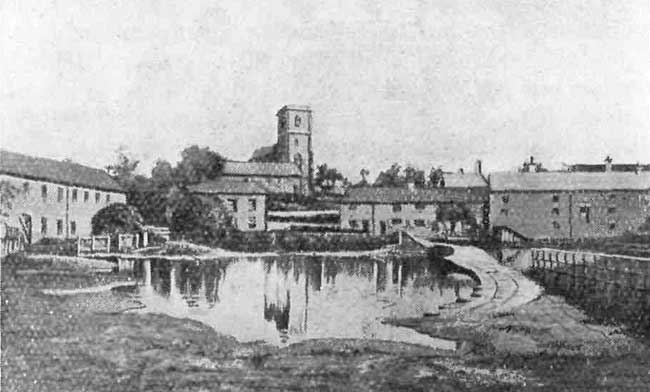THOMAS HOLMES was a stocking-maker, and subsequently, various other trades or occupations. He has been a prominent and pronounced figure in Bulwell for many years. He took an active part in what was called the fight for the Bogs, for which financially he suffered. He and others begged the money to start the British School. He led the forces in favour of amalgamation with the Borough. He was on the old Local Board; was highway overseer, or way-warden for three years; and was twice elected to the Town Council. He has been a local preacher over 60 years, and is vigorous at 84.
CHARLES ALLOWAY has for forty years been at the head of the National School, where he has done useful work, and has entered heartily into the spirit and welfare of the children under his charge. His May-day festivals were a great treat to others besides children. He has been many years organist at the parish church, and Sunday school teacher of a boys class. For thirty-five years he has conducted a Band of Hope. He wanted to continue at work, but the sixty-five years time limit operated unfortunately six months before he had fifty years school work. The Education Committee passed a resolution appreciating his work, and a red plush easy chair was subscribed for by the children and the teachers, and presented as a token of rest from many years labours.
SIR CHARLES SEELY, Bart., has been for more than 40 years, in connection with the Babbington Coal Company, one of the principal employers of labour in Bulwell. As he is happily still with us, vigorous at the age of 80, he will be the last man to wish for an eulogium. It may, however, be said that he became M.P. for Nottingham in 1869, and so continued to 1874, and from 1875 to 1891. He was High Sheriff in 1890, and was made a Baronet in 1896. His work in connection with the Nottingham General Hospital, to which valuable institution the Bulwell and Bestwood men so largely subscribe, has extended over 45 years, when he first became a Governor. He has filled the office of president, and has been chairman of the Weekly Board since 1896. He was Colonel of the Robin Hoods from 1875 to 1891.
A FEW ITEMS IN A PROGRAMME.
There are certain advantages which may be secured for Bulwell, if the best of the men and women in the parish will co-operate in acts to be done in Bulwell, without having regard to the opinions entertained as to Acts passed at Westminster.
The beautifying of Bulwell is an object worth the effort, by obtaining the planting of trees in suitable spots in the widest streets, and encouraging the adorning of the backyards with climbing plants, and the windows with flowers.
With the Park and the Forest, Bulwell is well-off for the formation of classes for rambles to study nature. Who will accompany the young people as an interpreter ?
There are probably 500 voluntary workers in all the departments of religious, social, and civic life. The young ones want training by books, lectures, study, and otherwise; for a trained worker is worth double an untrained one. Who will help in the training ?
What have the boys done amiss that the Boy Scout movement is almost a blank, and the Boys' Brigade has not double its present strength ? What movements are there that will so readily develop manliness, self-restraint, self-reliance, courtesy, discipline, power of observation, health, usefulness ? Are there not a dozen men in Bulwell ready to become guides, helpers, officers ?
The girls want helpers who will train them in the blessed work of making happy homes, to be aided by all the handy-work that a good mother shows in making home a little heaven. "Give her purity, truth, and love," every good mother prays for her girl, but she must also be taught how to do things, and to do them well.
The miners, collectively, are the best able to lead in the question of preventing intemperance, and the mothers, by an organized movement, may lead in raising the tone on the question of social purity, but the thoughtful men must rally in hearty support. The churches should see to the circulation of pure literature, and the cultivation of chivalry.
What causes operated whereby the "men of Bulwell" fell from the high position of manliness, energy, self-reliance, and self-government they held for more than 400 years ? By what means has the recovery, during the past 50 years, been aided ? and how may such advantages be perpetuated and developed ? The young people may well be encouraged to write essays on the foregoing. Here is £1 offered towards a prize fund, if the heads of the schools, Day and Sunday, will formulate a little scheme.
Where is the money to come from for a Bulwell Social Improvement Fund? A bazaar of "Bulwell for Bulwell," supported heartily by all classes, would easily raise £250; but money is not half as important as personal service.
The grandest event that could happen in Bulwell would be if all the people would open their hearts to the reception of the provision the loving God has made for them by the acceptance of the Christ as their Saviour and Lord, for then the men who work in darkness would see a Great Light, and women who sigh and weep because of their heavy life-burdens would hear the words "Come unto Me, and ye shall find rest unto your souls;" all the children would be taught of God, and in every house in Bulwell there would be thanksgiving, and the voice of melody.

FIFTY YEARS AGO.
